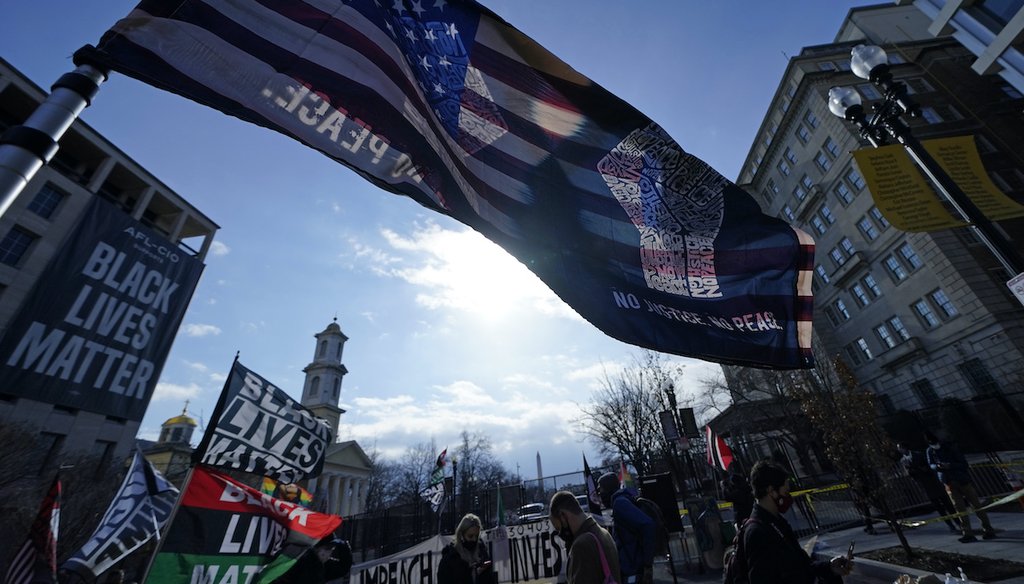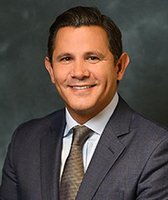Get PolitiFact in your inbox.

Flags fly in Black Lives Matter Plaza as President Joe Biden is sworn in during 59th Presidential Inauguration, Wednesday, Jan. 20, 2021, in Washington. (AP)
If Your Time is short
-
Biden made several promises related to voting rights, criminal justice, housing and education designed to benefit people of color.
-
Biden promised to study reparations for African Americans, but did not commit to paying for reparations.
-
Biden’s first 100 days will be focused on COVID-19 and the economic fallout, which also have racial implications. Biden told civil rights groups that racial justice was going to be part of everything he does, not just one or two issues on the side.
When Joe Biden won the U.S. presidency, he thanked African Americans for delivering him a victory — and he said that it was now his turn to deliver for them.
"I mean it, especially in those moments and especially for those moments when this campaign was at its lowest ebb, the African American community stood up again for me. You’ve always had my back, and I’ll have yours," he said.
Months earlier when Biden accepted the Democratic nomination, he said that the nation was issuing "the most compelling call for racial justice since the ’60s."
Biden chose as his running mate California Sen. Kamala Harris, the first Black woman and first person of Indian descent to serve as vice president. And he pledged to appoint the first African American woman to the U.S. Supreme Court.
Now in the White House, Biden aims to answer that call by delivering on promises to address systemic racism in housing, jobs, education, criminal justice and voting rights.
After he won, Biden told leaders of civil rights groups that racial justice was going to be part of everything he did."Not one or two issues on the side," said Marc Morial, CEO of the Urban League. "We take him at his word and hold him to it."
PolitiFact will monitor Biden’s progress on 100 promises, including many about racial justice, on our Biden Promise Tracker. We gave the same treatment to Donald Trump and Barack Obama.
PolitiFact tracks campaign promises in order to inform readers how well elected officials carry out their agendas. We rate campaign promises based on verifiable outcomes, not on intentions or effort. We found Biden’s promises on his campaign website, essays and public appearances.
Biden faces the challenge of making progress on racial justice while Congress and the public is focused on impeachment, security concerns and what so far has amounted to a sluggish vaccine rollout.
Biden’s promises related to the vaccine and the economy have racial implications,"but they are not the reparations conversations people want him to have on Day 1," said Howard University political scientist Niambi M. Carter, an expert on Black politics.
Biden made clear in his first days in office that racial justice will be part of his initiatives across all areas, including his $1.9 trillion recovery plan and executive order on advancing racial equity through the federal government by removing barriers to jobs. for people of color and other underserved groups.
Advocates for reparations say it would be a way to make amends to the legacy endured by those descended from millions who were enslaved for centuries when the U.S. permitted human bondage. Biden promised to support a study of reparations for African Americans, but he didn’t commit to supporting monetary reparations. House Democrats have introduced bills since 1989 to develop proposals for reparations, but efforts have languished. A 2019 House bill to study reparations had 173 co-sponsors but never reached a vote.
"Getting it through the Senate would be a litmus test about his power and the power of Democrats in that body," Carter said.
Biden’s other promises that would benefit people of color span the life cycle. They include providing affordable childcare, making historically black colleges and universities tuition-free for all families with incomes below $125,000, and increasing access to affordable housing.
Democrats are considering using budget reconciliation, a Senate process that allows legislation to be enacted with only a simple majority, rather than requiring 60 votes. Such legislation could include housing vouchers and expanding investments in house. But the 50-50 split in the Senate, with Harris as the tie-breaker, poses a challenge to more far-reaching policies, said Jen Butler, spokesperson for the National Low Income Housing Coalition.
The racial gap in homeownership is rooted in past federal housing policies that discriminated against African Americans and people of color.
"The racial wealth gap is because of public policy, not just private actions," Morial said. "Public policy ought to be part of dismantling it."
Biden promised to update the Voting Rights Act, signed into law in 1965 in an effort to prevent denying the right to vote based on race. In 2013, the U.S. Supreme Court made moot a provision that required certain jurisdictions with histories of discrimination to submit any proposed changes in voting procedures to the federal government. The process is called preclearance.
Biden promised to pass the Voting Rights Advancement Act, which would lead to a new process for pre-clearing election changes.
"It's an effort to address what SCOTUS held was an unconstitutional defect in the old provision," said Dale Ho, director of the ACLU's Voting Rights Project.
Biden also promised to "incentivize states to automatically restore voting rights for individuals convicted of felonies once they have served their sentences." The practical impact will depend upon how serving their "sentences" is defined and whether that includes paying fines, fees and restitution. States’ approaches to felon disenfranchisement vary.
Democrats have re-introduced HR 1, a sweeping election reform bill that includes restoring rights to felons to vote in federal elections after they have left jail or prison.
While a close Senate faces a lot of priorities, "there are few things more important to the public right now than free, fair, accessible elections," said Myrna Pérez, an expert on voting rights at the Brennan Center for Justice.
Biden promised to create a national commission on policing that would bring to the table civil rights activists and law enforcement.
"We’re going to sit down there and we’re going to work it out," Biden said in a speech in Kenosha, Wisconsin.
Biden is limited as to what he can require thousands of state and local law enforcement agencies to change. While Biden could threaten to hold off funding if agencies don’t follow certain federal guidance, federal funding amounts to only about 3% of local law enforcement spending nationwide, according to The Marshall Project, a nonprofit newsroom covering criminal justice.
Biden has also pledged to decriminalize marijuana and expunge prior use convictions. Researchers have found racial discrepancy in marijuana-related arrests across the nation.
"Biden believes no one should be in jail because of cannabis use," Biden wrote on his website.
This promise raises questions, including whether people caught possessing pot could still face onerous fines, which can be racially disproportionate.
Ohio State University law professor Douglas A. Berman said he believes Biden’s promise to decriminalize marijuana is intentionally vague.
"It’s still a useful aspirational statement, but the devil is in the details," Berman said.
One option Biden has is supporting Sen. Cory Booker’s Marijuana Justice Act, which would make marijuana legal at the federal level and expunge convictions of those who served federal time.
Biden also proposed eliminating cash bail, eliminating the federal death penalty and incentivizing states to eliminate the death penalty.
There is no question these criminal justice proposals would benefit African Americans if enacted, said Marc Mauer of the Sentencing Project.
"In part this is due to the overlap between race and class, particularly in the use of cash bail, where Blacks are disproportionately represented among low-income people," Mauer said. "The marijuana initiative is more directly related to law enforcement practices, where decisions are made to police Black neighborhoods more heavily than others."
RELATED: Which campaign promises did Joe Biden tackle first?
RELATED: Joe Biden tackles immigration, hoping to undo Trump-era policies
Our Sources
Joe Biden campaign, Lift every voice: The Biden plan for Black America, 2020
Congress.gov, HR 1, Jan. 4, 2021
U.S. Department of Justice, National Sources of Law Enforcement Employment Data, April 2016
The Marshall Project, What Biden’s Win Means for the Future of Criminal Justice, Nov. 8, 2020
National Low Income Housing Coalition, Racial Disparities Among Extremely Low-Income Renters, April 2019
NPR, Organizers Of D.C. March For Reparations Won't 'Cower In Fear Of Terrorist Threats' Jan. 13, 2021
National Conference of State Legislatures, Restoration of Voting Rights for Felons, Jan. 8, 2021
Email interview, Marc Mauer, Sentencing Project senior advisor, Jan. 14, 2021
Telephone interview, Niambi M. Carter, Howard University associate professor of political science, Jan. 14, 2021
Telephone interview, Marc H. Morial, President and CEO of the National Urban League, Jan. 15, 2021
Email statement, Arisha Hatch, Vice President of Color Of Change, Jan. 15, 2021
Email interview, Jen Butler, spokesperson for the National Low Income Housing Coalition, Jan. 15, 2021
Telephone interview, Douglas A. Berman, Ohio State University law professor, Jan. 14, 2021
Telephone interview, Myrna Pérez director of the Brennan Center's Voting Rights and Elections, Democracy, Jan. 15, 2021
































